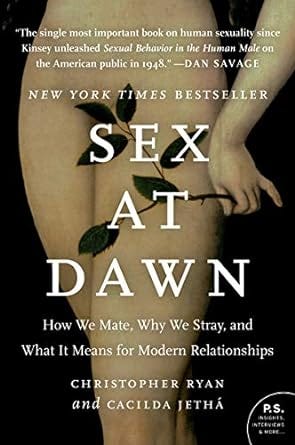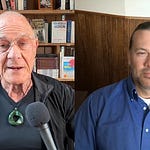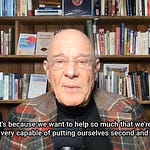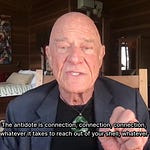Dear listener,
This week I am privileged to bring you my recent interview with Chris Ryan, author of Sex at Dawn and Civilized to Death, and host of the Tangentially Speaking podcast.

In our conversation, Chris offers a thought-provoking perspective on human sexuality. Rather than telling us whether monogamy is right or wrong, he sheds light on the evolutionary history of our species and the evidence that suggests humans are not naturally monogamous. He does not pass judgment on whether one way is better than another, but rather encourages us to recognize the challenges that arise when we go against our evolutionary inclinations.
As Chris eloquently puts it, "Just because you've decided to be a vegetarian doesn't mean bacon stopped smelling good."
I invite you to tune in for our discussion, and be sure to check out Chris’s podcast, hosted on Substack. I’ve added it to my recommended publications as well.
Golden light,
Dr. Richard Louis Miller
Listen to Learn:
What evidence from anthropology suggests that humans evolved as promiscuous or multi-male, multi-female mating species?
How does culture and societal norms impact the way women choose mates and the perception of monogamy?
What are the implications of understanding our evolutionary history on modern relationships and expectations?
How does the research on hunter-gatherer societies challenge the assumption of men's control over women for paternity assurance?
Why is it important to consider the economic and cultural context when examining the viability of monogamy?
What role does biology play in shaping human sexual behavior and preferences?
How does understanding the evolutionary perspective on monogamy contribute to compassion and empathy in relationships?
Links and Resources
Sex at Dawn, Book by Christopher Ryan
Tangentially Speaking podcast
Mothers and Others, by Sarah Hrdy, a renowned anthropologist and primatologist, has written extensively about parenting in hunter-gatherer societies.
My Books
Freeing Sexuality: Psychologists, Consent Teachers, Polyamory Experts, and Sex Workers Speak Out
Psychedelic Wisdom: The Astonishing Rewards of Mind-Altering Substances
Psychedelic Medicine: The Healing Powers of LSD, MDMA, Psilocybin, and Ayahuasca
Integral Psychedelic Therapy (co-edited with Jason A. Butler & Genesee Herzberg)
NOTE: The podcast is always freely available thanks to our paid subscribers. Please share this post to show your support for transparency. The following transcript distills the key points from this show into a condensed form. It is meant as a reference - listen to the full episode for an accurate rendition of the conversation.
Transcript
00:00 Introduction and the Fragility of Democracy
[00:00:21] Richard Miller: With us today is a man who is being eternally vigilant on another topic. Christopher Ryan comes to us with his book, which I have here, Sex at Dawn. Christopher is going to be talking to us about his questioning of the cultural tradition of heterosexual monogamy. Welcome to Mind, Body, Health, and Politics, Chris.
[00:03:01] Chris Ryan: It's great to be here.
[00:03:04] Richard Miller: Chris, am I correct that you are questioning the concept of normative heterosexual monogamy as a sustainable way of people living together?
[00:03:17] Chris Ryan: Mostly, I'm not really questioning whether it's sustainable or appropriate in the modern world. I'm more questioning the normative aspect of what you said there. You know, I think that monogamy, much like vegetarianism, is arguably a very good way to live one's life.
It can be very healthy, it can be ethically superior to being an omnivore. There are a lot of reasons that people could choose to be vegetarians, and I respect and honor those reasons. So, my point is simply that our ancestors were not vegetarians. We didn't evolve as herbivores.
And so, if you choose to live that way, which is a viable option, don't expect it to be easy because it isn't the way our ancestors lived. The sort of joke I often use is just because you've decided to be a vegetarian doesn't mean bacon stopped smelling good, right?
[So, there's no judgment, no advocacy in Sex at Dawn. We're not saying monogamy is doomed or a false approach to relationships. We're simply stating it's very difficult because of the way we evolved as a species, and that understanding of what kind of species we are should be integrated into your relationship model.
[00:05:11] Richard Miller: When you say it's difficult, are you basing that on the fact that 50 percent or more of marriages in the United States end in divorce, or are you saying it's difficult for more intrinsic reasons related to the nature of humanity?
[00:05:31] Chris Ryan: Yeah, I think the latter. The divorce rate is certainly a piece of evidence supporting that thesis, but the real core of the matter for me is looking at our bodies, looking at closely related primates, looking at our current sexual behavior, and examining anthropological data from societies that aren't dealing with the edifice of shame that we encounter in Judeo-Christian societies.
And when you examine all these different perspectives, you see Homo sapiens evolved to be what scientists would call a promiscuous or multi-male, multi-female mating species. And this, to me, is quite clear from the evidence. So, pornography is one of the biggest industries in the world for a reason. We're fascinated by sexuality, and the notion that we are naturally a monogamously mating primate contradicts all the evidence. It would also make us the only group-living primate that is monogamous, which is unheard of in the primatological literature.
[00:07:01] Richard Miller: Well, let's pretend we're in a courtroom, and you're going to make the case, anthropologically, sociologically, perhaps economically, for why monogamy is not the best solution for living together, collaborating, and making a decent life. I may challenge you, I may agree with you, but it's your job to make the case.
07:40 The Case Against Normative Heterosexual Monogamy
[00:07:37] Richard Miller: As you have in your book, Sex at Dawn, which I have here for everyone to see, it's a must-read. If you're a thinking person, you really want to consider what Christopher Ryan is saying here. In the book, and now over here, in the courtroom of Mind, Body, Health, and Politics, he makes his case.
[00:08:00] Chris Ryan: Okay. Well, with one modification, I want to say that if I am making this case, it's in the context of hunter-gatherer bands, which is how our species lived for 99.5 percent of our existence, depending on when you decide we became Homo sapiens. We've existed as anatomically modern Homo sapiens for about 300,000 years.
That's the most recent estimate. And agriculture didn't arrive on the scene until at most about 10,000 years ago. So, a very small fraction of our time as a species has been in settled communities with hierarchical political systems and men having much higher status than women. All this stuff is very recent in our existence as a species.
So, to make this case, I'm not making it for now again because I'm not passing any judgments on monogamy. My parents were monogamously married for 54 years until my father died. And I'm endlessly grateful to them for the fact that they stuck together and that they loved each other and gave me a very stable upbringing.
So, I don't ever want to be interpreted as criticizing monogamy per se. All I'm saying is we need to understand what kind of species Homo sapiens is, so that if you choose to be monogamous, understand the challenges you'll be facing. Don't expect it to be easy. Also, my ultimate goal is that people have more compassion for themselves and for each other by understanding how difficult this can be because it goes against our nature as a species.
To lay out the whole case would take a long time…
[00:10:03] Richard Miller: That's alright. We've got plenty of time. I want to hear the whole case.
[00:10:15] Chris Ryan: Well, I want people to buy the book. I can't give it to them for free. Uh, no, I'm joking. Of course. There are, as I said, four major sources of information. So, let's start with anthropology. If you look at hunter-gatherer bands that live presumably the way our ancestors did, and there are complicated reasons that we can make this presumption about the similarities between contemporary hunter-gatherers in the Amazon or in the Kalahari Desert or in Australia or Papua New Guinea and the way our ancestors lived.
But if we take that as a given and we look at hunter-gatherers, we find that this idea that women were looking for a man who would be a protector and provider, and men are looking to spread their genes as far and wide as possible, which is the central struggle of the so-called war between the sexes that many modern theorists from Darwin to Steven Pinker and Richard Dawkins have us believe is our nature. Men and women will always be at war because we have opposing reproductive agendas. But this is based on several false premises. One is that people understand that sex causes pregnancy. It turns out many hunter-gatherer groups around the world don't know that sex causes pregnancy.
If you think about it, there's no reason they necessarily would. People are having sex, women are getting pregnant. Where's the connection? Some societies believe that if a woman steps over a smoky fire, she'll get pregnant. Many hunter-gatherer groups believe that a baby is a reincarnated spirit of an elder who has died recently.
And so her pregnancy is actually triggered by the death of an elder. Many societies believe in something anthropologists call partible paternity, which means they believe that a fetus is literally made of accumulated semen. So, a woman who wants to have a child who is funny, smart, and athletic will make sure she has sex with the funny guy, the smart guy, and the athletic guy so that their essence will all be included in her child, and these men all believe that they are the fathers of this child. So, the idea that men are monitoring women's sexual behavior to assure their paternity, which is central to this standard narrative of human sexual evolution, turns out it doesn't make any sense at all because people don't have these assumptions about sex causing pregnancy that we assume they do.
Furthermore, on an economic level, a corollary to this standard theory is that women are looking for a man who will be a provider. But when you actually look at how hunter-gatherers deal with economics, anthropologists refer to them as fiercely egalitarian, meaning food is shared, defense is shared, access to all resources is shared, and they are fiercely egalitarian.
14:08 Anthropological Evidence for Non-Monogamous Relationships
[00:14:14] Chris Ryan: In other words, if you are found to be hoarding food and not sharing, that's one of the worst things you can do in these societies. It's incredibly offensive behavior. So, it's very severely punished, and children from infancy are taught to share, share, share. That's how we survived as a species, by cooperating and sharing resources.
[00:14:45] Chris Ryan: So, go ahead.
[00:14:49] Richard Miller: Make the connection for me between the hunter-gatherers, a woman who might want sperm from a funny guy, a smart guy, and an athletic guy, in order to create that kind of being, and a modern woman who might be thinking, I need a guy with a bunch of money who's big and strong and is going to protect me.
And so I'm going to be careful in choosing that guy and live with that guy only, because he's got the things that I'm looking for to take care of me and my baby. She's not thinking about the woman in the hunter-gatherer tribe who has no idea that semen impregnates an egg and creates a baby.
She's a modern woman who knows damn well one time creates the baby. So, make that connection for us.
[00:15:46] Chris Ryan: Well, the connection is mitigated by culture, right? This modern woman you're positing has thousands of years of severe punishment for being sexually open and relaxed in her consciousness. Women who got pregnant outside of marriage were basically finished, stoned to death in some areas, some areas they still are, even if they were raped.
It's not her fault, but she's become worthless because she was raped. These are brutal assumptions about men possessing women. But the research we did in Sex at Dawn makes it very clear that this idea of men possessing women is post-agricultural. This is not built into human nature.
And when you talk about what modern women are looking for, of course, a woman who has had no access to resources for millennia has to go through men. This is why the father walks the woman down the aisle and hands her to the husband. She's property. She's the father's property until she's married, and then she's the husband's property. We still enact these rituals.
But in hunter-gatherer societies, there's none of this. Women have direct access to resources, so they don't need the man to provide for them and their children. And to the extent that men do the hunting and provide the bulk of the meat to the society, that meat is shared equitably, regardless of who her partner is.
[00:17:40] Richard Miller: So you're saying it's only in the last 10,000 years of our 300,000 year existence that women have become chattel.
[00:17:51] Chris Ryan: Right. If you read the Old Testament, one of the passages that's very well known is "Thou shalt not covet thy neighbor's wife." If you read that in context, it's about property. The context is not to covet thy neighbor's wife, nor his house, nor his slave, nor his animals. So really, it's saying don't covet thy neighbor's possessions, and his wife is one of those possessions.
This idea of men controlling women to assure paternity is not built into human nature; it's actually an artifact of agriculture. And so, the woman you're talking about, who's choosing a mate based on his job, well, of course, she does in this society. But if you go to a place like Denmark or Sweden, where there's a stronger social safety net, women are much less focused on the man's potential to provide for them.
Furthermore, research shows that women who are ovulating judge men differently than when they're not ovulating, indicating innate, instinctive programming that comes into effect regarding mate selection.
Although not necessarily knowing it, there are innate behavioral instinctive programming that comes into effect.
A fascinating study by Claude Wedekind in Switzerland wanted to understand why women's sense of smell is so much stronger than men's and how it relates to mate selection, specifically through detecting complementary immune system characteristics, which could indicate a biological component to mate attraction beyond socio-economic factors.
[00:26:29] Richard Miller: But how does this fascinating experiment... I love it when my colleagues come up with these experiments. I've indulged in a few myself in my time.
[00:27:40] Chris Ryan: I gotcha.
[00:27:41] Richard Miller: Let's bring that back to monogamy versus other forms of cohabiting, such as polygamy.
27:46 Monogamy as a Recent Cultural Construct
[00:28:05] Chris Ryan: Right. Well, consider this: the idea that people had different ongoing sexual relationships with several different adults at any given time appears to be our natural mating system when not influenced by other factors like economics, religion, or various cultural overlays.
Omnipolygamy makes perfect sense in a hunter-gatherer group where everything else is shared. Sarah Hrdy, a renowned anthropologist and primatologist, has written extensively about parenting in hunter-gatherer societies. One of her books, "Mothers and Others," delves into the concept that children are considered the responsibility and joy of the group rather than belonging to anyone in a possessive sense. If a child is injured, whichever adult is nearest will provide assistance, without the need to alert the child's parents specifically. This lack of exclusivity extends to nurturing behaviors as well; women in hunter-gatherer groups will breastfeed children who are hungry, regardless of whether they are biologically theirs.
[00:29:17] Chris Ryan: This system avoids the notion of exclusive rights to children, and in hunter-gatherer societies, women commonly breastfeed children who are not biologically theirs, reflecting a communal approach to childcare. Furthermore, the biological aspect is nuanced in these groups since members are closely interrelated, having lived together for their entire lives. It's common for women to join another band upon reaching sexual maturity, a practice known as female exogamy, which helps reduce inbreeding. This practice is also observed in our closest primate relatives, chimpanzees and bonobos.
[00:30:22] Chris Ryan: Essentially, in a society where resources from food to protection are collectively shared, it logically extends that affection and sexual pleasure would be shared as well.
[00:30:45] Richard Miller: Society,
[00:30:47] Chris Ryan: indeed, in any case.
[00:31:04] Richard Miller: If I understand correctly, you're arguing that 290,000 years of evolutionary behavior have embedded certain patterns into our very makeup, influencing the last 10,000 years. Despite our shift from hunter-gatherer societies to a modern life centered around monogamous heterosexual coupling, you suggest that this deep historical foundation continues to affect our contemporary existence.
31:38 The Conflict Between Modern Monogamy and Evolutionary History
[00:31:53] Richard Miller: And that's why it isn't working. Because it,
[00:31:58] Chris Ryan: You're saying it better than I could. Yes. Well, it works for some people, but it is an uphill climb.
[00:32:07] Richard Miller: That's very generous of you to say it works for some people. It's 50 percent end in divorce. Now, Christopher, how many things in your life would you be willing to take on if there was a 50-50 chance? Like, would you get in a car if you knew there was a 50-50 chance of having an accident? I don't think I would.
Would you get on a plane? I don't think I would. I want better odds. I really do. 50-50, would I invest my money in a deal that I had a 50-50 chance of losing all my money? And yet, we are investing in what you're pointing out to us has a 290,000-year history of being different than what we're experimenting with.
Like, we're at the table, playing a losing game, and we keep knocking our heads against the wall, wondering why we're doing this, and spending a fortune on couples counseling, trying to figure out what the hell's wrong here. And you're saying, yeah, it's not that there's something wrong, it's that you're going against 290,000 years of hardwiring.
[00:33:29] Chris Ryan: Right. And it's no different from something as simple as diet or exercise. If you want to understand the healthiest diet, look at what our ancestors ate. If you want to understand the healthiest activity rate, look at hunter-gatherers. They walk a lot, right? Our bodies and our consciousness are designed by time.
It's like a river. The path evolves; it erodes. And the more time that's gone by, the deeper the riverbed gets. And you're right. We're trying to go up against the current of our evolved nature, and it's a very hard thing to do. All I want to do is bring attention to the reality of the situation so that people can avoid unnecessary suffering. That's what motivates me to write both of my books, "Sex at Dawn," which I wrote with Casilda Jethá, and "Civilized to Death," which I wrote about nine years later.
Both are motivated by a desire to help people avoid unnecessary suffering. I feel like a lot of people are suffering because they think if they're attracted to someone other than their partner, then there's something wrong with them, or something wrong with their partner, or something wrong with their marriage.
And all I want people to understand is no, it's because you're a human being. That's baked into the cake of being human. You're going to be attracted to lots of people just like you like to listen to lots of different kinds of music. We don't say, "Oh, Beethoven's the best. I'm going to listen to nothing but Beethoven for the rest of my life. And if I feel like listening to the Rolling Stones, that means I'm a failed human being." That doesn't make sense. We're curious, intelligent, highly social, and sexuality, as you suggested earlier, is a key part of our nature. We are one of the very few mammals that have sex for non-reproductive purposes.
Other mammals only have sex when the female is ovulating. That's the only time because otherwise, it's a waste of effort and it's dangerous. Bonobos, humans, chimpanzees, dolphins are the only mammals that have sex for non-reproductive purposes.
[00:36:22] Richard Miller: Oh, so we're not the only ones.
[00:36:24] Chris Ryan: As I said, we're one of a very small handful. And there's a reason for this. It's not an evolutionary accident. We have sex when the female's already pregnant, when she's beyond menopause, and in ways, like oral sex and anal sex, that can't possibly result in pregnancy. That's vanishingly rare among mammals. The only mammals for whom this is the case—ourselves, bonobos, chimpanzees, and dolphins—are all highly intelligent, highly social mammals.
So, sexuality has been co-opted to fulfill functions beyond pure reproduction. That's very obvious, and any biologist will tell you that's very unusual. In the court of opinion, it's kind of funny that I'm in the position of trying to make the case that monogamy is not natural, when I really think someone else should be tasked with proving that monogamy is natural because if you understand the data, it's a very shaky case.
37:30 The Shaky Case for Monogamy
[00:37:50] Richard Miller: The more you make the case that monogamy is not natural, the more annoyed I'm getting. In fact, I'm getting very annoyed at this interview and it's maybe the first interview in 20 years that I've gotten so annoyed. Because you say that you're writing these books to help people because they're involved with something.
That is going against 290,000 years of history. And I'm listening to you and I see that you published your book in 2010. And that's 14 years ago. And I want to know why the hell didn't you come on my program 14 years ago when I was 71 and I could have changed my habits. And now I'm 85 years old.
38:27 Regret and the Need for Earlier Awareness
Richard Miller (00:38:44): And I'm in a monogamous relationship, and I'm learning that I'm going against 290,000 years of history. And I'm stuck at 85. It's a hell of a time to be learning this. Where were you 14 years ago when the book came out, darn it?
39:01 The Challenge of Monogamy
[00:39:02] Chris Ryan: I was around. Believe me.
[00:39:05] Richard Miller: God, where is my producer, Charlie? Why didn't you get Chris on this program fourteen years ago? It's too late; you can't go back in time.
[00:39:17] Chris Ryan: Well, maybe there's a time for monogamy. Maybe in your eighties is a good time.
[00:39:25] Richard Miller: Easy for him to say. The time when you're 85 years old, maybe that's the time, huh?
[00:39:31] Chris Ryan: And I'm sure you have a lovely partner and, uh, you know.
[00:39:37] Richard Miller: It's not a matter of that. I do have a lovely partner, but what you're pointing out so persuasively, verbally, and in your book is that we're going against our genetic makeup. We're swimming up a river, trying to dam a river, trying to block nature, and that's misguided. It is pure and simply misguided.
40:16 Exploring Alternatives
[00:40:08] Richard Miller: And no wonder we're failing. And no wonder the divorce rate is 50%. And the question I have for you, knowing this, Christopher, what do we do about it now? Is there an opportunity for massive cultural change? And if so, what do we do? Is the answer what's being called polyamory or omnigamy? Do we bind together in little tribes?
Do people who live in apartment buildings suddenly start getting together with other people on the same floor, rather than going down the elevator and never saying hello to each other for 10 or 15 years in a row and standing there in silence? Do they suddenly start coming together and raising children together?
What do we do?
[00:40:58] Chris Ryan: Yeah. Uh, coming together doesn't sound very romantic, does it?
[00:41:03] Richard Miller: Well, maybe it's a poor choice of words. Would you prefer merging?
[00:41:12] Chris Ryan: Swarming, maybe?
[00:41:15] Richard Miller: Okay. I'll go with that. It sounds a little bit like bees.
[00:41:21] Chris Ryan: Well, you know, I think the first step toward any social changes is understanding. So, I think there's a lot more understanding now and acceptance of ethical non-monogamy. And I think that's a step in the right direction. People are,
[00:41:42] Richard Miller: Everything about it is a step in the right direction except the nomenclature. I abhor defining anything in terms of what it's not.
41:49 The Spectrum of Non-Monogamy
[00:41:53] Chris Ryan: Yeah.
[00:41:54] Richard Miller: Non-monogamy. That doesn't tell me what it is, it just tells me what it's not.
Right, right? You could tell me 30 ways not to cross the street in Manhattan. And I still wouldn't know where the hell to cross.
42:15 The Evolution of Human Cooperation
[00:42:08] Chris Ryan: That's a good point. Yeah. And it's something that bothers me as well, because people often talk about polyamory as if it's the only alternative to monogamy. They sort of clump everything together as non-monogamy. So it must be this, whereas, as you say, there's a whole spectrum of ways to be non-monogamous.
So, you know, if you're in your eighties, you probably remember the swinging seventies, the Playboy Mansion, and Gay Talese's book, "Thy Neighbor's Wife," which was part of a sexual liberation movement where swinging became quite popular in the U.S.
That's a way of being non-monogamous that's very different from polyamory.
[00:43:02] Richard Miller: But at the foundation of what we're discussing, Chris, alternatives to monogamy are really about much more than sex. It's about ways of collaborating and cooperating and living together, of which sex is one component. People often get misled; they hear polyamory and think, "Oh, that just means a bunch of people want to have sex with each other."
No, it's not necessarily that, although I'm sure that's part of it. But it's also about how we live together and make a sustainable life. How do we educate ourselves? How do we make a living? How do we share, as you pointed out, the meat that when the gatherer goes out and brings back? How do we share it?
43:48 Beyond Sex: Collaboration and Cooperation
[00:43:57] Richard Miller: Rather than have what we presently have, which is a situation in which a few have so much and the great masses increasingly have so little.
[00:44:08] Chris Ryan: Yeah, I'm really glad you raised that, because you're right. That is a central issue that often gets lost in the discussion of, for example, testicle size and genital design, and sperm-related issues. There's a lot of technical evidence for this argument that I think really misses the point, which is that this isn't really about sex.
This is about how our species, long ago, co-opted sex as a way of establishing and maintaining cooperative, intimate social groups. That's what's really important. It was a component along with sharing food, helping raise each other's kids, and sharing access to resources. It was just one part of a comprehensive, egalitarian, cooperative way of interacting, which is really the thing our species does better than any other species.
We are highly cooperative and compassionate. The great tragedy of humanity, in my opinion, is that this cooperation and shared intimacy got off track somewhere around the advent of agriculture, where we became dominator, male-driven, hierarchical, top-down—much more like an ant colony than a bonobo troop. And we've just gone off track and we suffer from that.
We suffer from the stress, the lack of movement, the lack of connection. More people live alone than ever in the history of our species right now. This is crazy. What is the worst punishment we can give to the worst criminal? Solitary. Yes, put them alone, make them be alone, right?
That's so against our nature. So you're right, it's not about sex. It's about how do we raise children, how do we take care of each other as we age, and all those issues where, unfortunately, in American society especially, it's all monetized and institutionalized, and both children and the elders are abandoned.
46:34 The Origins of Violence
[00:46:37] Richard Miller: Chris, Chris, I think you and I agree on the diagnosis. We may have to have another interview to discuss the treatment plan. Because diagnosis without a treatment plan is nowhere. And what's the treatment plan? And I'm going to pivot now,
[00:46:58] Chris Ryan: Uh huh.
[00:46:59] Richard Miller: and ask you something else, because of the depth of your knowledge base and your wisdom.
In this 290,000 year period, and this 10,000 year period, what the hell is the story on killing each other? Where did that come from? How is it that these animals, called human beings, whether it was in the 290,000 time of hunter-gatherers or the post-agricultural time of this last 10,000 years, from whence cometh killing
47:20 The Impact of Agriculture
[00:47:39] Chris Ryan: Well, I argue
[00:47:42] Richard Miller: Let me add one thing. From whence cometh killing without eating?
[00:47:50] Chris Ryan: Yeah. My understanding of the advent of organized warfare between human groups is that it's a consequence of agriculture. And this is, you know, there are chapters about this in both "Sex at Dawn" and "Civilized to Death." My understanding is sort of directly 180 degrees from what Steven Pinker argues in a couple of his books, where he argues that hunter-gatherers were always highly violent and aggressive.
48:26 Ownership and Conflict
[00:48:29] Chris Ryan: It's actually gotten better. I go the other way. I see no evidence that hunter-gatherers were violent with each other, and every bit of evidence points to it being an agricultural, a post-agricultural institution.
[00:48:47] Richard Miller: So in other words, what you're saying is once lines got drawn—lines between people, between tribes, the line saying, 'this is mine and that's yours', demarcation—once that's drawn and I own this property, this woman, this hunk of meat, then I will kill you to either protect it or get yours.
49:23 Hunter-Gatherer Societies
[00:49:17] Chris Ryan: Right. The main difference between hunter-gatherers and agriculturalists or horticulturalists is the presence or absence of accumulated resources. So, hunter-gatherers, if you go to Tanzania now and hang out with the Hadza, they don't have anything. They don't have any grain stored or dried meat that they're going to use to get through the winter. They go out in the morning and hunt, and they eat what they get.
And that's how they live, day after day. So, if there's no accumulated resources, what is it you're going to be fighting about? Why would you attack an armed group of people who are very good with their bows and arrows and spears? Why would you attack them if there's nothing to gain?
[There's nothing there. There's no food, no gold, no anything. So
50:09 The Role of Accumulated Resources
[00:50:12] Richard Miller: You could attack them for their women.
[00:50:14] Chris Ryan: Yeah, but women can go where they want to go, and there are enough women for everybody. Women aren't a resource. You need to feed the women. You need to feed the children. So, there's sort of a natural homeostasis.
[00:50:30] Richard Miller: Well, except that some of our colleagues have made the argument that polygamy results in a lack of resources because if one guy has 30 women, there are going to be 29 guys with no women, and that's going to lead to violence.
[00:50:46] Chris Ryan: Sure. But again, that's in a post-agricultural world. That's in a world where you've got armies and accumulated wealth, and men of different statuses. Hunter-gatherers, everyone's got the same amount of wealth, which is virtually none, in terms of material possessions. So, if you look at hunter-gatherer societies, you see very little organized violence between groups, primarily because there just is no reason to do it, and there's lots of reason not to. So, yeah, I think, and you can look at circumstantial evidence as well, right? If we evolved to be killers of one another, why do we suffer from PTSD when we see someone suffer?
51:36 The Tragedy of Solitude
[00:51:43] Chris Ryan: When we see soldiers coming back from war who've seen destruction and death, why do they suffer the rest of their lives? If this is a natural part of human existence,
it clearly, I think, I have an answer for that. What, I don't know if it's a good one. I said it at the beginning in my introduction to this program. 95 percent or more of us human beings are friendly, cooperative animals that just want to get along and hang out together, eat, and raise children. But there's a 5 percent or less group that are very different.
52:32 The Influence of Psychopaths
[00:52:23] Richard Miller: And I don't know that they suffer from PTSD. I never heard of a hit man suffering from PTSD. I never heard of an assassin suffering from, and I've treated them. I have treated people who are killers. And they don't suffer in the same way when they kill somebody. So, that could be the answer. We're dealing with this small, very powerful group within our group, who behave so differently that they are disrupting the entire planet.
[00:52:57] Chris Ryan: And you could argue that in our society, psychopaths thrive. They find themselves in positions of great status and power because of the incentive structure of Western society. As I'm sure you know, there are more psychopaths per capita on Wall Street and in politics, and at the top of Fortune 500 companies than in the general population.
[00:53:29] Richard Miller: We know that. We've heard tape recordings of them sitting in rooms laughing about the people that they've stolen their life savings from. Literally laughing as they're doing it.
[00:53:41] Chris Ryan: Yes. And we have a presidential candidate who says that people who serve their country are suckers and somehow, that's acceptable. John McCain, who spent six years in captivity, was labeled a loser because real people don't get captured.
Richard Miller: It's outrageous. That's another whole topic for us. Where are you right now? Where are you sitting in the country or the world?
00:53:41] Chris Ryan: I'm in a very strange little town in Colorado called Crestone, which is a couple thousand people. It's the only place in North America that has a permit to conduct open air cremations. So if you live in this town and you die, you can be cremated out in the desert. I'm at 8,000 feet. There are about a dozen spiritual centers here, Tibetan Buddhist and Shinto from Japan and Zen Buddhists from all over the world, different spiritual centers.
[00:54:59] Richard Miller: And this is where you live full time?
[00:55:01] Chris Ryan: Yes.
[00:55:03] Richard Miller: I'm sitting at Will at the health sanctuary. That I created in 1972 at Wilbur Hot Springs, about two hours north of San Francisco. I'm going to give you a quick picture of where I'm sitting.
[00:55:21] Chris Ryan: It's beautiful. Wow.
[00:55:23] Richard Miller: Nature in the raw.
I lost all my bedrooms to a massive fire in 2013. One year later, we opened up again with everything rebuilt and we haven't looked back.
This Crestone sounds like a very special place.
[00:55:56] Chris Ryan: Yes, it is. There are a lot of hot springs here, actually, in this area. I think you and I probably have some friends in common as well. I looked at your archives. And several people that you've had on your podcast, I've had on mine several times, Dennis McKenna and Charles Grobe.
[00:56:27] Richard Miller: Oh, these are friends of mine.
[00:56:33] Chris Ryan: Yes, I've been doing it for about 12 years.
[00:56:36] Richard Miller: Well, I have three books out on psychedelic medicine, another one coming out this year, Psychedelic Medicine at the End of Life, and another one coming out after that called Psychedelic Medicine Adverse Effects. I'd be honored to be interviewed by you on your program.
Well, I haven't seen him in a hundred years. I didn't even know if he's still alive.
[00:57:29] Richard Miller: So how do you make a living in Crestone, Colorado?
[00:57:34] Chris Ryan: I write. I got the two books out, as I mentioned, and I write on Substack and I do my podcast. And like I said, I've been doing this podcast since the days when nobody knew what a podcast was. So I was very fortunate to sort of build up an audience back in the day, and they've stuck with me over the years.
57:40 Living in Crestone, Colorado
[00:58:00] Chris Ryan: So I make a modest income from the podcast and my Substack writing.
[00:58:05] Richard Miller: Well, that's good. I know you're not making a living off books because I've got four in print and more coming. And I don't see the money as something you can live on. You know that as well as I do. By the way, my latest book is connected to your book, Sex at Dawn. It came out a few weeks ago.
58:14 The Future of Interviews
[00:58:26] Richard Miller: It's called Freeing Sexuality. You might take a little gander at it.
[00:58:31] Chris Ryan: Yeah.
[00:58:33] Richard Miller: But it's a very different kind of book than yours. I really love your book, Sex at Dawn. Here it is again, folks. We're coming to the end of our time. Christopher Ryan, thank you so much for being here today. I really think we should consider a second interview, unless you want to reverse it and interview me.
[00:58:54] Chris Ryan: We can. We can do both. We'll just keep like ping pong, just knocking it back and forth.
Till we get...
Although you did scare me when you said this was the most annoying interview you've done in 20 years. I thought we were done there.
[00:59:09] Richard Miller: Well, that was a kind of setup. I like being sort of an imp. And I speak that way at times when I'm going to say something really positive, but it sounds a little scary at first.
[00:59:23] Chris Ryan: Now I know how to take it.
[00:59:26] Richard Miller: That's right. Christopher Ryan, Sex at Dawn, thank you for today. And thank you, gentle listeners, for being with us again on this broadcast of Mind, Body, Health, and Politics.
59:47 Closing Remarks
[00:59:40] Richard Miller: Remember, we come out with a new program every Tuesday morning at nine o'clock. As Chris mentioned, you'll want to check us out on Substack, Facebook, Instagram, YouTube, all the social media platforms. Subscribe and participate in our tribe. Until next time, this is Dr. Richard Miller reminding you.
That good health is worth fighting for, and it's essential for life, liberty, and the pursuit of happiness.












